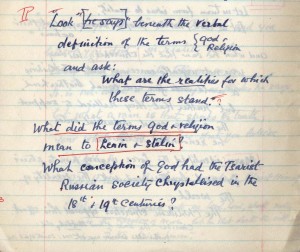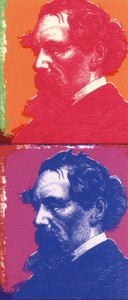It was a few weeks ago that we had a phone call from the BBC asking whether researchers could come to look at some of the Hewlett Johnson papers in preparation for a documentary on the Cold War. It’s always nice to hear that people are interested in exposing our collections to a wider public than we can reach, although we’re aware how a huge amount of research is often distilled down into two or three minutes on screen. So we booked in an appointment, gave some advice on how to search the catalogue and were delighted when an email came through detailing specific incidents and periods which the researcher was interested in.

Johnson’s manuscript notes
When it came to it, the director of the programme came to do the research and found herself confronted with half a dozen large archival boxes, albums of photographs, a diploma for a prize and two boxes of newspaper cuttings! With staff on hand to answer specific enquiries about Johnson, his work and the archive, the director managed to wade through this material in slightly less than a day, recording all of the materials which she thought would be of use to the programme. These spanned from Johnson’s sermon notes (at present a sadly underused resource) to sections of the Dean’s autobiography in which he recorded his meetings with (in)famous individuals like Stalin and President Truman.
The filming itself took place on Monday (12 November) in the picturesque surroundings of the Deanery and the Cathedral Library, in the Precincts. A member of staff was needed to transfer the materials and to monitor their use – to step in if any damage was likely to be caused. The programme is presented by historian Dominic Sandbrook who, along with the director, was enthusiastic about the Dean, discussing his beliefs and his reasons for supporting the Communist cause so much longer than many of the other fellow travellers did.
 It was a privelege to film in the Deanery, with a protrait of Johnson on one wall and his bust on another, bringing his radical sermon notes back to the room in which they were probably written. This series, unlike Ian Hislop’s Stiff Upper Lip or Restoration Man, two other programmes which have featured Special Collections and Archives, was scripted, with room for improvisation and improvement during the day. This meant several rehearsals to get the shot right and the word flow working, then a few takes and some close ups. What never ceases to amaze me is the amount of time it takes to film sequences which often turn out to be only a small section of the programme. Stiff Upper Lip spent most of the day filming the Special Collections reading room for a section of the programme which lasted about 3 minutes. Monday’s BBC crew spent all day in and around the Cathedral, filming sources in the Deanery and the beautifully restored Cathedral Library, for what will probably amount to no more than 3 or 4 minutes of screen time.
It was a privelege to film in the Deanery, with a protrait of Johnson on one wall and his bust on another, bringing his radical sermon notes back to the room in which they were probably written. This series, unlike Ian Hislop’s Stiff Upper Lip or Restoration Man, two other programmes which have featured Special Collections and Archives, was scripted, with room for improvisation and improvement during the day. This meant several rehearsals to get the shot right and the word flow working, then a few takes and some close ups. What never ceases to amaze me is the amount of time it takes to film sequences which often turn out to be only a small section of the programme. Stiff Upper Lip spent most of the day filming the Special Collections reading room for a section of the programme which lasted about 3 minutes. Monday’s BBC crew spent all day in and around the Cathedral, filming sources in the Deanery and the beautifully restored Cathedral Library, for what will probably amount to no more than 3 or 4 minutes of screen time.
So is it worth it? Even once the filming is complete, there are copies to be sent, references to clarify, copyright procedures to double check and often queries right up to the final edit. It’s an ongoing process which can run over several months for us (although much longer for the production company!) Yet despite this, I think it’s always worthwhile for our materials to be involved in television productions or articles. There’s the obvious bonus for us of publicity, but the broadcasting of materials we hold means much more than this. It enables the collections to be analysed and used alongside other, perhaps dispersed materials, and illuminate a far wider debate – whether it’s the British character or attitudes towards Communism during the mid twentieth century. It’s a pleasure to meet such enthusiasm about how apparently inert materials, perhaps insignificant on their own, are part of a much wider tapestry of national and international heritage.

‘Searching for Light’ manuscript
In a few months time, I hope that Dominic and the team will be ready to share this and their wider research on the Cold War with all of us – I’ll let you know as soon as I hear any more.





